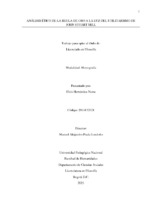Mostrar el registro sencillo del ítem
Análisis ético de la regla de oro a la luz del utilitarismo de John Stuart Mill.
| dc.contributor.advisor | Prada Londoño, Manuel Alejandro | spa |
| dc.contributor.author | Hernández Neme, Elvis | spa |
| dc.coverage.spatial | No hace referencia a un espacio geográfico en especifico | spa |
| dc.coverage.temporal | No hace referencia a un intervalo de tiempo en especifico | spa |
| dc.date.accessioned | 2021-10-04T18:38:33Z | |
| dc.date.available | 2021-10-04T18:38:33Z | |
| dc.date.issued | 2021 | |
| dc.identifier.uri | http://hdl.handle.net/20.500.12209/16416 | |
| dc.description.abstract | A partir de la lectura de El utilitarismo de John Stuart Mill, este trabajo busca realizar, por un lado, una caracterización de la propuesta ética milleana; y, por otro, caracterizar la regla de oro desde dos perspectivas: una religiosa y otra secular. Esto se realiza con el propósito de responder a las siguientes preguntas: ¿es compatible la regla de oro, desde una perspectiva religiosa, con el utilitarismo de Mill? Y ¿es compatible la regla de oro, desde una perspectiva secular, con el utilitarismo de Mill? | spa |
| dc.format.mimetype | application/pdf | spa |
| dc.language.iso | spa | |
| dc.publisher | Universidad Pedagógica Nacional | spa |
| dc.rights.uri | https://creativecommons.org/licenses/by-nc-nd/4.0/ | |
| dc.subject | Utilitarismo | spa |
| dc.subject | Regla de oro | spa |
| dc.subject | Principio de mayor felicidad | spa |
| dc.subject | Ética | spa |
| dc.title | Análisis ético de la regla de oro a la luz del utilitarismo de John Stuart Mill. | spa |
| dc.publisher.program | Licenciatura en Filosofía | spa |
| dc.subject.keywords | Utilitarianism | eng |
| dc.subject.keywords | Golden rule | eng |
| dc.subject.keywords | Principle of greatest happiness | eng |
| dc.subject.keywords | Ethics | eng |
| dc.type.hasVersion | info:eu-repo/semantics/acceptedVersion | |
| dc.rights.accessrights | info:eu-repo/semantics/openAccess | |
| dc.rights.accessrights | http://purl.org/coar/access_right/c_abf2 | |
| dc.relation.references | Anscombe, E. (2006). Filosofía moral moderna . En M. Platts, Conceptos fundamentales éticos (págs. 25-53). Ciudad de México : Universidad Nacional Autónoma de México | |
| dc.relation.references | Guitérrez, G. (1990). La estructura consecuencialista del utilitarismo. Revista de Filosofía vol. III , 141-17 | |
| dc.relation.references | Wattles, J. (1996). The Golden Rule. New York : Oxford University Press | |
| dc.relation.references | Gensler, H. (2013). Ethics and the Golden Rule. New York: Routledge | |
| dc.relation.references | Neusner, J., & Chilton, B. (2008). The Golden Rule: The Ethics of Reciprocity in World Religions. New York : The Tower Building | |
| dc.relation.references | Singer, M. (1963). The Golden Rule . The Journal of the Royal Institute, 293-314 | |
| dc.relation.references | Hobbes, T. (2005). Leviatán. Fondo de Cultura Económica: Buenos Aires | |
| dc.relation.references | Mill, J. S. (2014a). El Utilitarismo. En J. S. Mill, El Utilitarismo (págs. 50-113 ). Madrid: Alianza | |
| dc.relation.references | Mill, J. S. (2014b). Sobre la libertad. Ediciones Akal: Madrid | |
| dc.relation.references | Mill, J. (2014c). Tres ensayos sobre la religión. Editorial Trotta: Madrid | |
| dc.relation.references | La Biblia. Edición: Reina Valera (1960). Consultado en: https://www.biblegateway.com/ | |
| dc.relation.references | Shemtov, E. (27/03/2021). Kedoshim: La esencia del judaísmo. Recuperado de: https://www.jabad.org.uy/templates/articlecco_cdo/aid/2569280/jewish/Kedoshim-La-Esencia-del-Judasmo.htm | |
| dc.relation.references | Talmud. Recuperado de: https://www.sefaria.org/texts/Talmud (27/03/2021) | |
| dc.publisher.faculty | Facultad de Humanidades | spa |
| dc.type.local | Tesis/Trabajo de grado - Monografía - Pregrado | spa |
| dc.type.coar | http://purl.org/coar/resource_type/c_7a1f | eng |
| dc.description.degreename | Licenciado en Filosofía | spa |
| dc.description.degreelevel | Pregrado | spa |
| dc.type.driver | info:eu-repo/semantics/bachelorThesis | eng |
| dc.identifier.instname | instname:Universidad Pedagógica Nacional | spa |
| dc.identifier.reponame | reponame: Repositorio Institucional UPN | spa |
| dc.identifier.repourl | repourl: http://repositorio.pedagogica.edu.co/ | |
| dc.title.translated | Ethical analysis of the golden rule in light of John Stuart Mill utilitarianism. | spa |
| dc.description.abstractenglish | From the reading of The Utilitarianism by John Stuart Mill, this work wants to propose, on the one hand, a characterization of the Mill’s ethical proposal. On the other hand, it is intended to characterize its guiding principle from two perspectives: religious and secular one. This is done with the purpose of answering the following questions: Is the guiding principle compatible, from a religious perspective, with Mill's utilitarianism? And is the guiding principle, from a secular perspective, compatible with Mill's utilitarianism? | spa |
| dc.rights.creativecommons | Attribution-NonCommercial-NoDerivatives 4.0 International |

